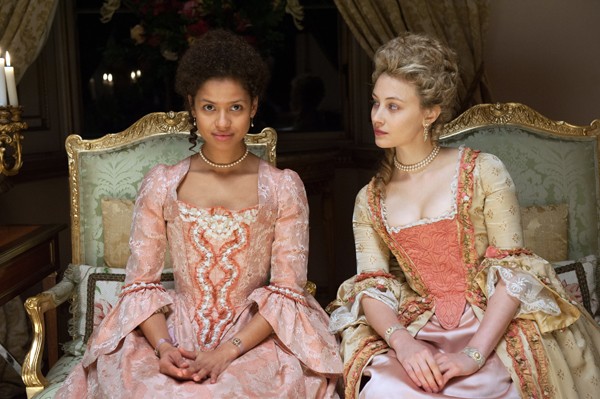London, 1769. The harbor of the slave-trading capital of the world is thick with cargo and commerce: in other words, people as chattel. Into this scene steps one who is by all appearances another piece of property: a brown-skinned girl walking beside a man of wealth.
From there, though, appearances fail the truth of the matter. The little girl is not a slave but rather a free daughter. The nobleman, Captain Sir John Lindsay (Matthew Goode), is her father, the offspring of a miscegenist relationship that wasn’t borne out of exploitation but of love. The beloved mother has died, though, and Lindsay has orders back to sea, so he is taking his daughter, Dido Elizabeth Belle, into the care of his family. “I am here to take you to a good life,” he promises.
His great-aunt, Lady Mansfield (Emily Watson), great-uncle, Lord Mansfield (Tom Wilkinson), and Lady Mary Murray (Penelope Wilton), have a sharp disagreement over whether they will accept Belle into the family, but a word of approval from Lady Mansfield settles it. Lindsay bids adieu to his daughter, exits the stage, and promptly dies. That leaves Belle to grow up in the care of a group of aristocrats who are unsure how to handle presenting her to the rest of a disapproving society.

Gugu Mbatha-Raw is the Belle of the ball.
For Belle (played nicely by Gugu Mbatha-Raw), that’s the bad news. The good news is that her father did right by her. He owned up to her paternity rather than owning her. He provided her a space he knew would accept her, despite the unique situation. And he left her with an inheritance of 21,000 pounds a year — a considerable sum that will make for an attractive dowry once she comes of age. The great fear is that she’ll become an old maid, like dear Lady Mary. Belle can hypothetically marry into a good family with that kind of coin. But will a family in good standing in society overcome the surface stigma from her skin color to embrace the surface legitimacy from her wealth? And that’s not to even broach the subject of love.
The careful, nuanced plot has a lot to offer. Instead of simply presenting a biopic about overcoming racism, it builds a case that it was but one of many levels of societal failure. Belle doesn’t just have to remember her race but has to navigate other waters that tide against her: She’s an illegitimate woman in a paternalistic place that values lineage and marriage.
Her cousin, Elizabeth Murray (Sarah Gadon), doesn’t fair much better. A case could be made that she has it worse. Even though she’s smart and comely and of noble birth, she doesn’t have the financial title to bring to a marriage. Belle and Elizabeth come of age being courted by Oliver and James Ashford (James Norton and Tom Felton — Draco Malfoy from the Harry Potter films) and their madam of a mom (Miranda Richardson). James gropes Belle at a party. “How dare you?” she accuses. “With ease,” he says.
The film’s subplot involves Lord Mansfield, who so happens to be the Lord Chief Justice of England, embroiled involving insurance and slaves as property. How he rules could strike a blow to the heart of slavery in England — an economic death sentence for the nation, slavers argue — or could further entrench the institution.
Belle is based on a true story. It is a noble film — perhaps more generously good-hearted than it is actually good — though Amma Asante’s film is good. There are some lofty ideals well said and backed by musical swells. But, a noble film is often worth the while — and there’s something about a film like it released sometime other than during the year-end Oscar season that suggests more genuine than cloying intentions.
Belle
Opens Friday, May 23rd
Ridgeway Cinema Grill